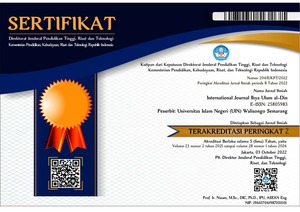Sharpening Students’ Creative Thinking Skills Based on Spiritual Metaphysics by Using I'tikaf Muslim Method
DOI:
https://doi.org/10.21580/ihya.25.2.18342Keywords:
Creative Thinking Skills, Metaphysical, SpiritualAbstract
This study aims to analyze the creative thinking skills of students based on spiritual metaphysics to determine the factors that influence the students' creative thinking skills using the I’tikaf Muslim method. Iktikaf worship means remaining silent and remaining in something. According to Hanafi scholars, iktikaf means staying silent in the mosque, which is usually used for congregational prayers, and according to Shafi'i scholars, iktikaf means remaining silent in the mosque by carrying out certain deeds with the intention of AllahThe research method is applied qualitatively with a case study method. The research sample is students of the Philosophy Science Study Program, totaling 20 students. This research was conducted on odd-semester Philosophy Study Program students in the 2022/2023 academic year. Data collection techniques using questionnaires and interviews with students. Data analysis techniques by reducing data, presenting data, and drawing conclusions. The analysis results were carried out to test the validity of the research data with data triangulation. The results showed a variation in the creative thinking skills of Philosophy students with a low category of 45%, medium 30%, and high 25%. The research conclusion shows that the factors influencing creative thinking skills are intelligence, knowledge, mindset, personality, motivation, and environment. The research implies that it can determine the appropriate Metaphysics learning model to improve the creative thinking competence of Philosophy students.
Downloads
References
Abdullah, M. (2004). Kalam Philosophy. Student Library.
Al-Bukhari. (2016). Sahih Hadith History of al-Bukhari (p. 1172).
Chamami, M., Mas’ud, A., & Ruswan, R. (2021). Educating The Heart: The Concept of Qalb Education in Minhāju Al-Atqiyā’i fi Syarḥi Ma’rifati Al-Ażkiyā’i ilā Ṭarīqi Al-Auliyā’i by KH. Sholeh Darat. Nadwa: Jurnal Pendidikan Islam, 15(2), 129-148. doi:https://doi.org/10.21580/nw.2021.15.2.9372.
Danusiri, A. (2017). Idaaratu al Wahdah al Namthiyah li at Tathwiri al Tarbiyah al Islamiyah. Nadwa: Jurnal Pendidikan Islam, 10(2), 109-124. doi:https://doi.org/10.21580/nw.2016.10.2.1186.
Good, L. (1991). Metaphysics. Gramedia Pusataka Utama.
Haryani, T., Amin, M., Arifah, N., & Husna, A. (2019). Islamic Education in Supporting De-radicalization: A Review of Islamic Education in Pondok Pesantren. Nadwa: Jurnal Pendidikan Islam, 12(2), 259-272. doi:https://doi.org/10.21580/nw.2018.12.2.2581.
Latif, M., Syukur, F., Uswatunnisa, U., & Paidi, Z. (2023). The Mainstreaming Policy of Religious Moderation Education in West Sulawesi Province. International Journal Ihya' 'Ulum al-Din, 25(1), 69-81. doi:https://doi.org/10.21580/ihya.25.1.14150.
Katsoff, L. (1995). Introduction to Philosophy Ter. Soejono Soemargono. Tiara Wacana.
Musrifah, M. (2019). The Relevance of Al-Ghazali’s Tazkiyatun-Nafs Concept With Islamic Education in The Millennial Era.. Nadwa: Jurnal Pendidikan Islam, 13(1), 15 - 30. doi:https://doi.org/10.21580/nw.2019.1.1.3899.
RI, D. (2002). The Koran and its Translation. Fajar Mulya.
Saefuddin, D. (2002). Modern Thought and Islamic Thought, Intellectual Biographies of 17 Figures. Grasindo.
Scruton, R. (1986). A Brief History of Modern Philosophy From Descartes to Wittgenstein. PT Pantja Simpati.
Shaleh, D. A. N. (2000). Historical Background of the Revelation of the Verses of the Qur’an. Diponegoro Publishers.
Shalihin, R., & Widodo, H. (2020). The Problems of Islamic Religious Education Teacher for Curriculum Development in Transmigration Area. Nadwa: Jurnal Pendidikan Islam, 13(2), 219 - 234. doi:https://doi.org/10.21580/nw.2019.13.2.4974.
Shonhadji, A. (2014). Durratun Nasihin Mutiara Mubaligh. Al Munawar.
Sulaiman, A. (2016). Getting to know Islamic Philosophy. Rama Widya Publishers.
Syarif, M. (1991). God and Beauty (Cetakan IV). Mizan.
Syarifuddin. (2019). Introduction to Metaphysics. CV Man Hajj.
Syarifuddin. (2022). Tariqah in Sufism. Mardeka Kreasi.
Utomo, S., & Mu’anayah, N. (2020). Epistemology of Islamic Education Al-Jabiri Perspective of the Conservative-Modernist-Neo Modernist Flow and Burhani-Bayani-Irfani. International Journal Ihya' 'Ulum al-Din, 22(2), 162-179. doi:https://doi.org/10.21580/ihya.22.2.5673.
Downloads
Published
How to Cite
Issue
Section
License
By submitting an article to the journal, the author(s) agree to transfer the published article's copyright to the journal, which will act as the publisher. This means the journal will have the right to publish the article in various forms, including reprints. The journal will maintain the publishing rights to the published articles.
This work is licensed under Creative Commons Attribution-ShareAlike 4.0 International License.
In line with the license, authors and third parties (readers, researchers, and others) are allowed to share and adapt the material. In addition, the material must be given appropriate credit, provided with a link to the license, and indicated if changes were made. If authors remix, transform or build upon the material, authors must distribute their contributions under the same license as the original.



